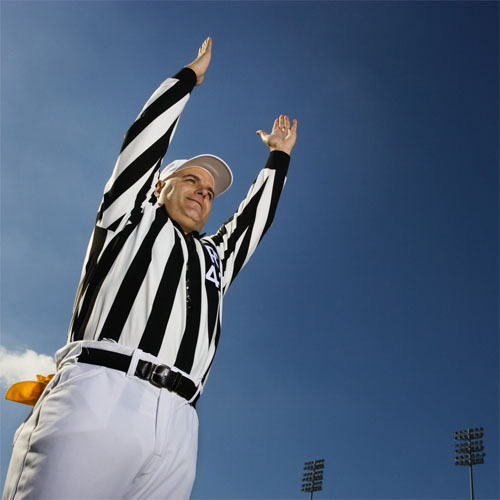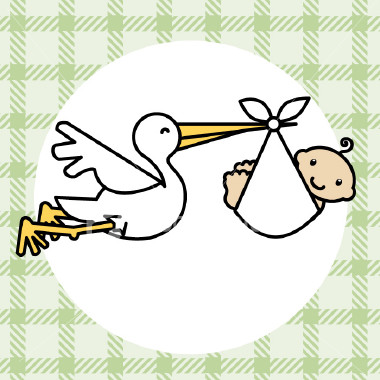
Zebra
Somewhere in, NJ
Male, 62
I've officiated football for over 30 years, now in my 26th on the college level. I've worked NCAA playoffs at the Division II and III level. In addition, I've coached at the scholastic level and have been an educator for over 35 years. I have no interest whatsoever in being an NFL official! Ever!
Oooh, good question. First, if a defender intercepts a pass from the five yard line in to the goal, he gets momentum, meaning if he ends up in the end zone it was his momentum that put him there so he isn't penalized. It will be his team's ball at the spot of the interception - btw, you'll see an official drop a bean bag at that spot to mark it. However, that isn't what you asked. You wrote "he runs back into the endzone ", meaning he put himself in the endzone. If he falls or is tackled there, it's a safety.
As noted above, on a running play, a foul behind the basic spot (in this case the end of the run) is enforced from the spot of the foul. It may or may not be a first down. In the play above, there was a gain well beyond the line to gain, so in enforcing the foul, you had a first down. But if the hold was, say, only five yards beyond the line of scrimmage, that is from where the penalty is enforced. So if there was more than five yards to go, a ten yard penalty is an issue. Enforcing from five yards beyond takes it to five yards behind. No first down.
First, minor correction: B receives the kick. The foul by A is a previous spot, meaning a rekick after penalty enforcement.
These are all line if scrimmage fouls. In some cases your confusion may simply be the terminology the referee used in making the announcement.
Most of what you list are defensive fouls. If the offense lines up "in the neutral zone" the play never goes off, similar to a false start; often that's referred to as offside. If the defense lines up in the zone, that's the famous "free play " foul; the play goes off but it won't be adjudicated til thd play is over. It's also a "neutral zone infraction", similar to the defense jumping into the neutral zone before the snap. Aa s point of information, in college and NFL, defense offside/neutral zone/encroachment us a "live ball goul"; the play continues. In high school, the defense being offside shuts down the play.
Casting Director
 Are the melt-down auditions on American Idol staged?
Are the melt-down auditions on American Idol staged?
Obstetrician Gynecologist
 Do you find it creepy when men want to go into gynecology?
Do you find it creepy when men want to go into gynecology?
Hospice Nurse
 Do most patients in hospice know they are going to die soon?
Do most patients in hospice know they are going to die soon?
I can only imagine what happened that generated THIS question!
Lots here so one step at a time. The whistle blows, play is supposed to stop. In theory, the "play kills itself", meaning that even if a whistle didn't sound,if a player, for example, jumped on the pile, that is still a foul. "But I didn't hear a whistle!" says over-zealous player. You jumped on a pile of players!
You ask if there is an explicit rulebook exception for when the ball is loose; I'm guessing you mean what happens if the ball is loose - or not in possession, such as a pass in the air - and the whistle sounds. Yes, there is a rule for that. It is termed an "inadvertant whistle"; the official screwed up and, yes, I've done it. As have most officials, whether they admit to it or not. Depending on the result, different things happen. Too much to cover here.
Next, penalty for not stopping? Hmm, yes, but there's some judgmenf involved. Example A: player calls for a fair catch, whistle blows, he takes off. Technically, that is a delay of game. Careful throwing that one. The most obvious is Example B: Whistle blows and player continues to block or tackle. It could be a personal foul; not for not "stopping" but for the forceful action (contact) when it should be stopped.
No. The offense put the ball in the endzone, so that can't be a safety. Now, if he left the endzone and then went back in - on his own - and then was tackled, yes, that's a safety, because the ball was put in the endzone by the defense.
Wrong football. No idea
-OR-
 Login with Facebook
Login with Facebook (max 20 characters - letters, numbers, and underscores only. Note that your username is private, and you have the option to choose an alias when asking questions or hosting a Q&A.)
(A valid e-mail address is required. Your e-mail will not be shared with anyone.)
(min 5 characters)
By checking this box, you acknowledge that you have read and agree to Jobstr.com’s Terms and Privacy Policy.
-OR-
 Register with Facebook
Register with Facebook(Don't worry: you'll be able to choose an alias when asking questions or hosting a Q&A.)